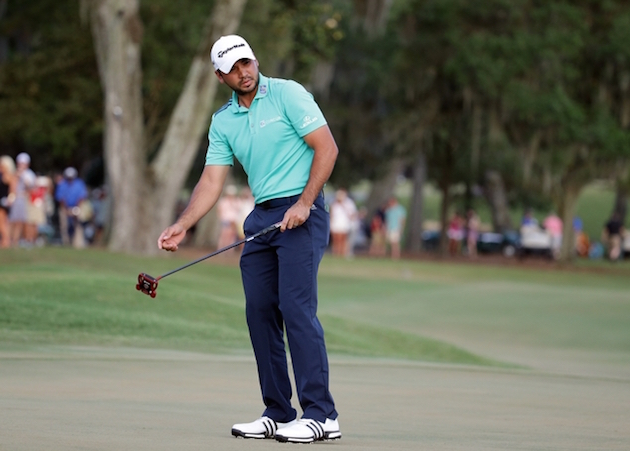
Jason Day of Australia, gestures as his ball misses the 18th cup for birdie during the third round of The Players Championship golf tournament Saturday, May 14, 2016, in Ponte Vedra Beach, Fla. AP
AKRON, Ohio — Jason Day pulled out of the Olympics on Tuesday because of the Zika virus, costing golf its No. 1 player as it returns from a century-long absence at the games.
The sport has lost two of its biggest stars in the last week, adding to the perception that the Olympics are not a high priority. Rory McIlroy, a four-time major champion, also said Zika will keep from competing in Rio de Janeiro.
“The sole reason for my decision is my concerns about the possible transmission of the Zika virus and the potential risks that it may present to my wife’s future pregnancies and to future members of our family,” Day said in a statement. “I have always placed my family in front of everything else in my life.”
The 28-year-old Australian and his wife, Ellie, had their second child in November, and he has said they want more children.
Shane Lowry of Ireland, who got married in April and plans to start a family, also withdrew Tuesday. That makes six golfers, including two of the most prominent athletes in Day and McIlroy, to specifically cite Zika for not going to Rio. The others are Charl Schwartzel and Branden Grace of South Africa, and Marc Leishman of Australia, whose wife’s immune system has not fully recovered after she nearly died last year of toxic shock syndrome.
“With Rory and myself pulling, I don’t know if that will trigger anyone else,” Day said. “It’s not my decision. … Some guys are in different situations. Some guys are younger and single and can take that chance, and some guys are in the same situation as me and have children or going to have children, get married and stuff like that. It’s a difficult one for those guys.”
American cyclist Tejay van Garderen is among a handful of athletes outside of golf who also cited Zika as the reason behind not going to Rio. Basketball star Stephen Curry didn’t specifically cite Zika but noted that “other factors” played a role in his decision to skip the games.
Brazil has been the hardest hit of the approximately 60 countries that have reported an outbreak of Zika, the mosquito-borne virus linked to severe birth defects and possible neurological problems in adults.
Day first expressed concern a month ago at the Memorial and said he had been consulting doctors so he could make a smart choice.
“I wouldn’t be pulling out just because it’s not safe or something like that down there, because I’ve never been down to Brazil and I don’t know if it is safe or not,” Day said at the Bridgestone Invitational. “I’m withdrawing from the Olympics because of the Zika, and that’s the main reason here, because I just don’t want to put my family at risk because of it.”
Australia has three players in the top 50 in the world, and all of them have withdrawn — Day, Adam Scott (No. 8) and Leishman (No. 39). Next in line would be Scott Hend (No. 75) and Marcus Fraser (No. 81).
Day had been among the strongest proponents of competing in the Olympics, as had McIlroy and other young stars. But as the July 11 deadline nears for qualifying for Rio, some top golfers have been wavering.
Among the stars who plan to play or have not decided are Jordan Spieth, U.S. Open champion Dustin Johnson, Bubba Watson, Henrik Stenson of Sweden and Masters champion Danny Willett of England.
Golf already has lost three of the top 10 players in the world. Scott was the first to withdraw. He said Olympics were never his priority in a year in which the schedule is crammed with major championships with far more historical significant than an Olympic medal.
The sport has not been part of the games since 1904 in St. Louis.
Louis Oosthuizen of South Africa cited scheduling concerns when he withdrew. Vijay Singh of Fiji briefly mentioned Zika but was more bothered by the schedule. Graeme McDowell, who was in line to replace McIlroy, withdrew late last week because his wife is due with their second child a few weeks after the Olympics and he did not want to be out of the country in the weeks leading to the birth.

